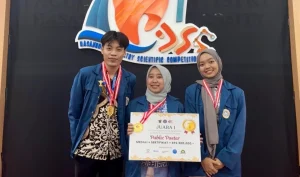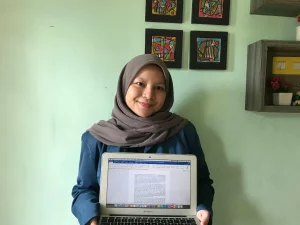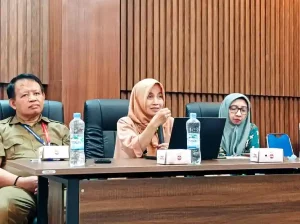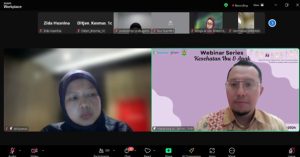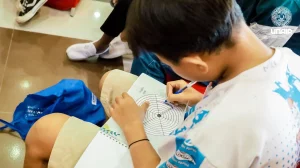UNAIR NEWS – Universitas Airlangga had the opportunity to send a number of delegations to study in Morocco. They traveled to there in order to fulfill guest lecture invitations while participating in summer course at International Business School at The Hague University Applied Science (THUAS).
The location of Netherlands Institute of Morocco (NIMAR) is in the City of Rabat – as the location of activities is based on the theme of the summer course this time, namely Islamic Finance. Morocco is a Muslim country with several sharia-based economic institution. Thus, it is a great place for learning the summer course.
The activity which lasted for two weeks – from July 8 to 19 was joined by a lecturer and three students from Department of Islamic Economics (EKIS), Faculty of Economics and Business (FEB), UNAIR. Namely Bayu Arie Fianto, S.E., MBA., Ph.D .; Evi Aninatin Ni’matul Choiriyah; Yasinta Suci Linggasari; and Asep Maulana.
“This is a part of FEB UNAIR and Hague International Business School collaboration. Their lecturer have been here as guest lectures. Well, yesterday it was our turn to fill the material with me as a guest lecturer. While three of my students participated the summer course, ” said Bayu.
On the occasion, Bayu taught four topics about Islamic Finance including Legal Standing of Islamic Finance, Islamic Financial Instruments, Introduction to Islamic Finance, and Islamic Microfinance. He also combined tests and quizzes through Kahoot. Thus, all participants understand the material.
“This program is not only a guest lecture, but there are tests, both pre-test and post-test. So, it must reach the specified value standard because it is related to the credit transfer system. Alhamdulillah, I can pass everything. In fact, one of our students, Evi, won the best score, “explained Lincoln University alumnus.

Besides, there were six other participants from The Hague University and University of Ez-Zitouna. Bayu revealed that he had experienced problems when giving material. Because, some participants are students of master’s program so it needs efforts to adjust teaching.
“Six other participants have different backgrounds. Even though they are not all Muslims, they are very active and enthusiastic in studying Islamic Finance because they see opportunities in this field. Therefore, they need to know sharia-based economic operations, “added Bayu.
Furthermore, Yasinta also shared her story about the summer course. The activity was a new experience for herself and her two friends. Because, there are many new things they have gained, especially knowledge about Islamic finance development in Morocco and Africa.
“Initially, we thought that if a Muslim country was familiar with Islamic economics, it was not. In Morocco, a new Islamic bank was established in 2017. In terms of schools, instruments and practices are also not the same as Indonesia. We came to know another perspective on Islamic Finance because there were non-Muslim participants and instructors, “he said.
Language differences are a major difficulty for Yasinta, Evi, and Asep. They don’t speak Arabic or French, which the main language in Morocco. However, they are grateful that the local community helped them.
“There are other participants from Morocco. They helped us to buy groceries at Souk (traditional market, ed). And they use three language in Arabic, English and Dutch while bargaining at the market, “Yasinta said.
In addition, the four delegates from FEB UNAIR had the opportunity to join an excursie study at an Islamic bank, Harvard Consulty, visit historic sites, and try out typical Moroccan dishes. Not only that, they can also study with two foreign instructors from The Hague University and Leiden University. (*)
Author: Nabila Amelia
Editor: Feri Fenoria Rifa’i




